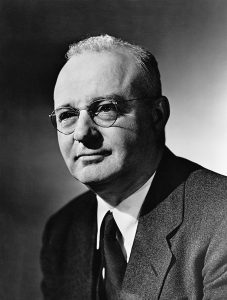
I recently learnt about the life of American chemical engineer Thomas Midgley, a mild-mannered inventor, who only lived 55 years and whom I had never heard of before, but whose impact was one of world-wide destruction and death. He has been dubbed the most destructive single organism on Earth!¹
Midgley was instrumental in the invention both of leaded gasoline and CFCs, two of the worst inventions ever, which continue to have untold human and environmental impacts.
Leaded gasoline, developed as an anti-knock agent for internal combustion engines, pumped toxic lead into the atmosphere for decades causing “serious long-term health problems from childhood, including neurological impairment [ie. lowering people’s IQ, as well as literally causing them to go crazy, like mercury did] and [linked] with increased levels of violence and criminality … around the world.”²
Midgley himself suffered twice from lead poisoning and knew of its dangers, but continued to lie about his fuel additive, tetraethyllead (TEL), sold as Ethyl. Only decades later, due largely to the work of Clair Patterson, the truth about lead poisoning became public knowledge and un-leaded fuel became the norm.
Later, Midgley went on to develop Freon, the first chlorofluorocarbon (CFC), for the use in refrigerators. He received accolades for his inventions and work, but three decades after his death, the ozone-depleting and greenhouse gas effects of CFCs in the atmosphere became widely known, and Freon (HCFC-12) has now been banned.
Midgley was not only a danger to the whole planet, but himself as well. In 1940, at the age of 51, he contracted polio and became severely disabled. In order to get out of bed, he devised an elaborate system of pulleys and ropes. As with his other inventions, this too eventually proved to be deadly. In 1944, he became entangled in the device and died of strangulation.
Imagine living such a life! Thinking that you are solving problems with helpful inventions and ending up leaving absolute carnage in your wake, with your inventions killing more people than even the worst dictator on earth, and adversely affecting generations of not only humans but animals and plant-life too! The mind boggles!
Here was someone with the best of intentions, with a first class education and a fine mind. Someone lauded as a hero and success at one time, whom history now calls a one-man environmental disaster³ and has nothing good to say about. It would have been so much better for the planet if Thomas Midgley had never existed. How very tragic.
But, to be fair, at the time he invented Ethyl, no one knew the dangers of lead in the environment; at the time he invented Freon, no one knew what CFCs would do to the ozone-layer.
This ties into another idea I heard of recently – the Dunning–Kruger effect – that people vastly overestimate their knowledge or competence in a field in which they are unfamiliar; basically that we don’t know what we don’t know, so we think we know a great deal. (On a side note, this may explain how 16-year-olds know everything!)
The fact is that all of us know very little compared to the sum of all knowledge in the universe and that even as a highly developed society, there are vast amounts of things of which we are totally unaware. In some instances we know we don’t know much – like about deep space or how the human brain works. But the scary thing is we don’t actually know how much, or what, we don’t know!
That is one of the reasons why being a Christian makes so much sense to me. I know I don’t know much, but I entrust my life and future into the hands of a God who knows ALL things – the beginning from the end, all things visible and invisible, the future and the past, the knock-on effects of every decision; and I obey Him because He alone knows the repercussions of all my actions and the legacy I will leave.
God forbid that history decides it would have been better if I had never been born! We all make some impact, big or small, on those around us and on those who come after us – our children and grandchildren, our pupils, those who read our books or watch our movies or engage with our inventions. But we are ignorant, finite creatures who within living memory have made the most incredible blunders, so I pray daily that God’s will, not mine, be done.
May misguided Midgley be a lesson to us all.
- By J.R. McNeill, environmental historian
- Wikipedia
- Fred Pearce, New Scientist
